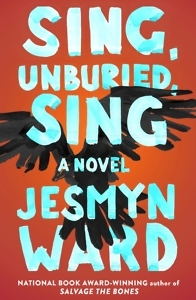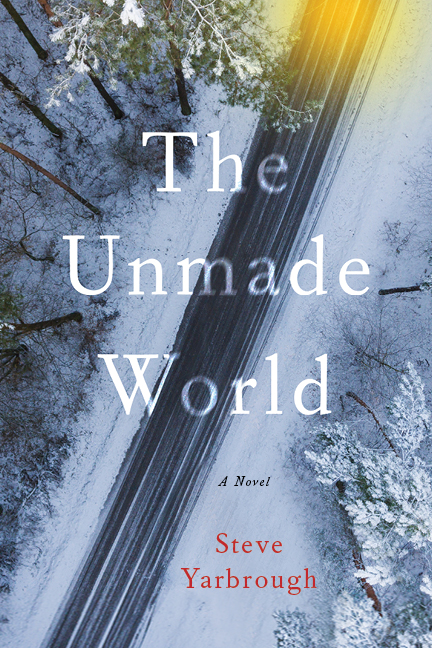Channeling Restless Spirits
Jesmyn Ward returns to familiar Gulf Coast territory in Sing, Unburied, Sing
Ghosts sit in chairs, ride in cars, and converse with the characters on this side of the veil in Sing, Unburied, Sing, the new novel by Jesmyn Ward. But visions of restless spirits are not the only mournful aspect of this tale about a family whose members are absorbing tremors caused by murder and drugs.

Because white people have always controlled the resources and the law in their coastal Mississippi region, color determines destiny for Pop and Mam, their daughter, and their mixed-race grandchildren. Their promising son was killed by a hot-headed racist, and Pop still battles the trauma of serving time as a teen at the infamous Parchman Farm penitentiary (a place that inspired David M. Oshinsky’s 1996 nonfiction book, Worse Than Slavery).
Ward, who teaches creative writing at Tulane University in New Orleans, is working in a familiar landscape. She grew up in the rural coastal community of DeLisle, Mississippi, and won the 2011 National Book Award for her second novel, Salvage the Bones, about a destitute Mississippi family’s stand against Hurricane Katrina. Her 2013 memoir, Men We Reaped, about the deaths in her hometown of five young black men, including her brother, was a finalist for the National Book Critics Circle Award.
Sing, Unburied, Sing, Ward’s third novel, revisits the humid air and dense vegetation of the Gulf Coast, as well as the ingrained racial injustice her writing confronts. The elderly Pop and Mam provide a stable home on a small farm for their drug-using daughter Leonie and her children, teenager Jojo and toddler Kayla. Their lives are enriched by mystical communication with nature, animals, and the spirit world, a sort of compensation for the deprivation they face in the “real” world. Their varying skills for tuning in to the subtle songs of life are inherited through Mam, a kindly seer who is bed-ridden with an untreatable cancer.
 Initially the story’s narration alternates between Jojo, who has just turned thirteen, and Leonie, who manages to get cocaine when she wants it but doesn’t bother to get her son a birthday present. Jojo, who hears the thoughts of a nearby horse or a dog as he moves around his grandfather’s animal pens, isn’t troubled by those magical experiences, but his mother’s indifference and occasional hostility haunt him. He relies on his grandparents for affection and is mesmerized by Pop’s tales about the time he served at Parchman, where he cared for a weak twelve-year-old sent to the penitentiary for stealing food for his starving family. Pop can’t bring himself to finish the story about the boy’s fate; it’s a mystery Jojo will be called on to solve.
Initially the story’s narration alternates between Jojo, who has just turned thirteen, and Leonie, who manages to get cocaine when she wants it but doesn’t bother to get her son a birthday present. Jojo, who hears the thoughts of a nearby horse or a dog as he moves around his grandfather’s animal pens, isn’t troubled by those magical experiences, but his mother’s indifference and occasional hostility haunt him. He relies on his grandparents for affection and is mesmerized by Pop’s tales about the time he served at Parchman, where he cared for a weak twelve-year-old sent to the penitentiary for stealing food for his starving family. Pop can’t bring himself to finish the story about the boy’s fate; it’s a mystery Jojo will be called on to solve.
As in Salvage the Bones, the children in Sing, Unburied, Sing form a protective alliance against a treacherously unreliable parent. The former book relied on the cohesive voice of its fifteen-year-old heroine, but Ward has uneven success in creating distinctive styles for the various speakers in her new work. Leonie’s internal monologue toggles between colloquial and literary speech, so that she might in one segment say, “The coke done had me chewing like this since last night,” and in another observe, “Three horses roam around the segmented fields that abut the house and a gaggle of hens scamper across the yard.”
Leonie is possessed by love for her children’s father, a white man whose racist father despises her, and she puts Jojo and Kayla in peril when she decides to take them on what will be a grueling road trip to fetch him home from the modernized version of Parchman, where he’s finished serving time for cooking meth. There will be a pitstop for drugs on this trip, but access to food will be unpredictable. As Jojo says when he recalls how his mother starved his pet fish, “Leonie kill things.” Ward creates a fascinatingly unlikable character in Leonie, stripping away the default excuse that drug addiction makes her an awful parent and exposing instead a cold heart. The ghost of her brother, Given, a talented high-school athlete who lost his life because he won a bet with a white man, is the only check on her selfishness.
Is the phantom Given—“this Given that’s been dead for fifteen years now, this Given that came to me every time I snorted a line, every time I popped a pill”—an invention of Leonie’s conscience? Do these characters turn to the spirit world for power because they feel impotent in common life? Ward answers such questions with some satisfyingly literal ghosts in this rich story. There are clear echoes here of Toni Morrison and William Faulkner, and you could also make a case for a comparison to Emily Bronte. But it’s more rewarding to simply read Ward as a unique talent observing a very specific and too rarely glimpsed place in the world.

Peggy Burch was books editor at The Commercial Appeal in Memphis for ten years, and she also worked as a deputy metro editor and Arts & Entertainment editor for the newspaper. She is a graduate of the Newhouse School of Public Communications at Syracuse University and holds a master’s degree in English literature from the University of Mississippi.


